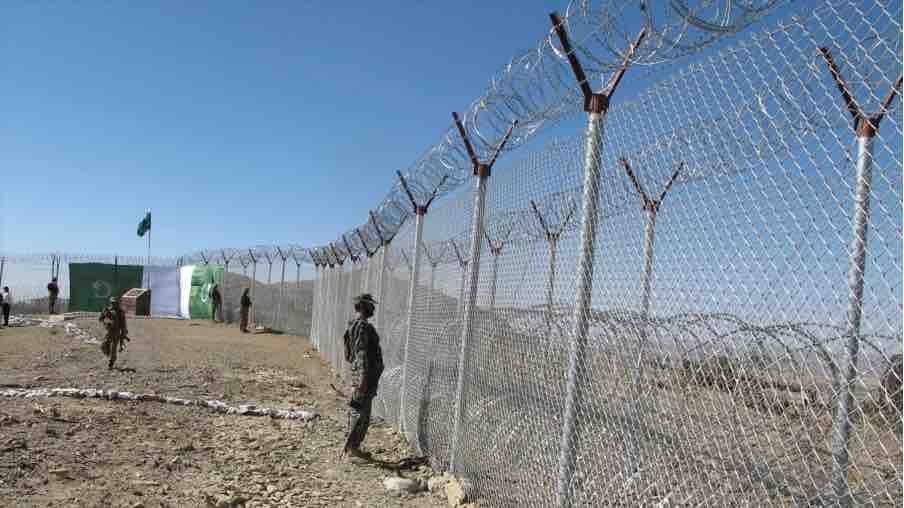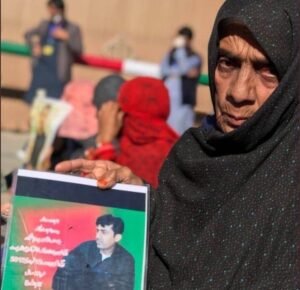Protests in Chaman Halt Border Trade and Highlight Local Grievances

By Shinwari
For nearly two weeks, life in Chaman, a crucial border town, has ground to a halt due to significant protests against new border crossing rules and the actions of security forces. These protests not only underscore local discontent but also illuminate broader issues affecting Pakistan-Afghanistan relations.
Starting in early May, essential services such as banks, passport offices, and Customs in Chaman have ceased operations. This shutdown followed a deadly confrontation between protesters and security forces. In response, traders, political figures, and daily wage earners have blocked the Quetta-Chaman national highway, a key trade route between Pakistan and Afghanistan, stranding hundreds of vehicles carrying goods for the Afghan transit trade.
The authorities from Chaman Chamber of Commerce and Industry, reported a complete suspension of trade through the Chaman border since May 4. The strike, led by the All Parties Traders Alliance, was sparked by the deaths of two protesters in clashes with security forces. Protests have been ongoing since October 2023 when Pakistan introduced the ‘one document regime,’ requiring valid travel documents for border crossing. This replaced the previous system that permitted travel with a Pakistani National Identity Card or an Afghan ID card (Tazkira).
The new regulations have severely impacted the local populace, particularly the thousands of daily wage workers who relied on cross-border trade. The primary demand of the protesters is to repeal these regulations and revert to the previous system. Despite several negotiation attempts, including efforts by Balochistan Assembly Speaker Abdul Khaliq Achakzai and Home Minister Ziaullah Langove, no resolution has been achieved.
The situation in Chaman is not an isolated incident but reflects deeper issues within the region. The Durand Line, which demarcates the border, has long been a source of contention and disruption. Historically, the region was inhabited by Pakhtuns who lived seamlessly across what is now the border. The division imposed by the Durand Line has disrupted this way of life, creating a border that many locals feel unjustly separates them from their kin and livelihoods.
The new border regulations have only exacerbated these issues, cutting off people from their daily economic activities and familial ties. The blockade and protests have led to significant economic losses on both sides of the border. Trade, a lifeline for many in this impoverished region, has come to a standstill, affecting local businesses and economies.
The impact of the protests extends beyond local grievances, affecting Pakistan-Afghanistan relations by severely disrupting trade between the two countries. The Afghan transit trade has particularly suffered, with goods unable to traverse the Quetta-Chaman highway, a critical route. This disruption is occurring when both nations are attempting to enhance economic ties.
Local leaders and human rights advocates assert that the Pakistani government must acknowledge the unique needs and historical context of the Pakhtun population along the border. Senior officials of the Human Rights Commission of Pakistan (HRCP), emphasized that the new regulations ignore the deep familial and economic ties crossing the border. Pakhtuns have crossed this border for generations, with families split and livelihoods dependent on cross-border movement.
The HRCP has urged for more inclusive policies that consider the region’s realities. This includes improving economic opportunities in Chaman, investing in local industries, and creating jobs to reduce dependency on cross-border trade. They also stress the importance of balancing national security concerns with the legitimate needs of the local population.Despite these recommendations, Pakistani authorities have been reluctant to address the genuine concerns of the Pashtun community, often sidelining their rights under the pretext of exaggerated national security threats.
The situation in Chaman underscores the complex interplay between local grievances and international relations. The ongoing protests and their economic ramifications highlight the urgent need for dialogue and a more nuanced border management approach. If left unresolved, the situation could further strain Pakistan-Afghanistan relations and exacerbate local hardships, potentially leading to greater instability in the region. The resolve of the protesters and the Pakistangovernment’s actions will shape the future of this crucial border area and the broader relationship between the neighboring countries.
The million-dollar question remains: Will Pakistan implement the genuine concerns of the Pashtun community? Addressing this question requires a commitment from the government to genuinely engage with and listen to the Pashtun community. It involves recognizing their unique historical and cultural context, addressing their economic needs, and balancing security measures with humanitarian considerations. The current protests in Chaman serve as a stark reminder of the consequences of neglecting these factors. Moving forward, the government’s willingness to adapt its approach and create policies that are inclusive and equitable will be crucial in resolving the situation and fostering better relations with both the local population and neighboring Afghanistan.
Author chooses a single pseudonym. Shinwari is a freelance journalist based in Peshawar, Pakistan.
Note: The contents of the article are of sole responsibility of the author. Afghan Diaspora Network will not be responsible for any inaccurate or incorrect statement in the articles.










